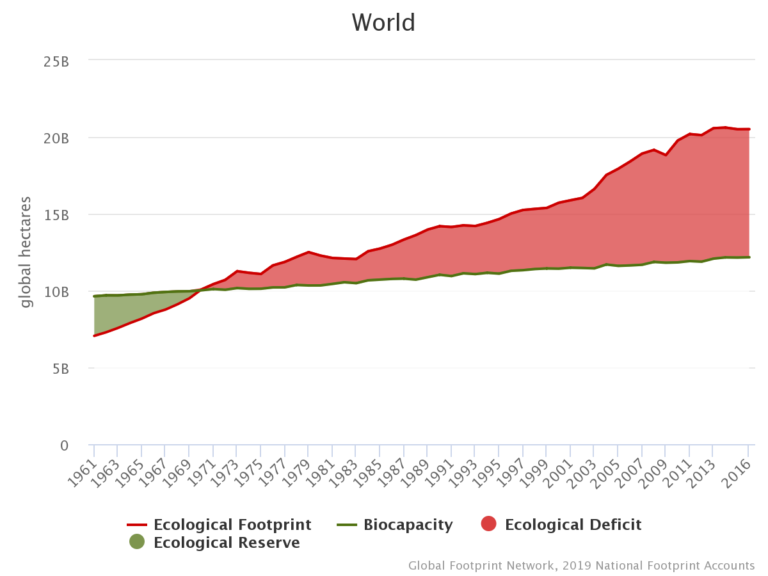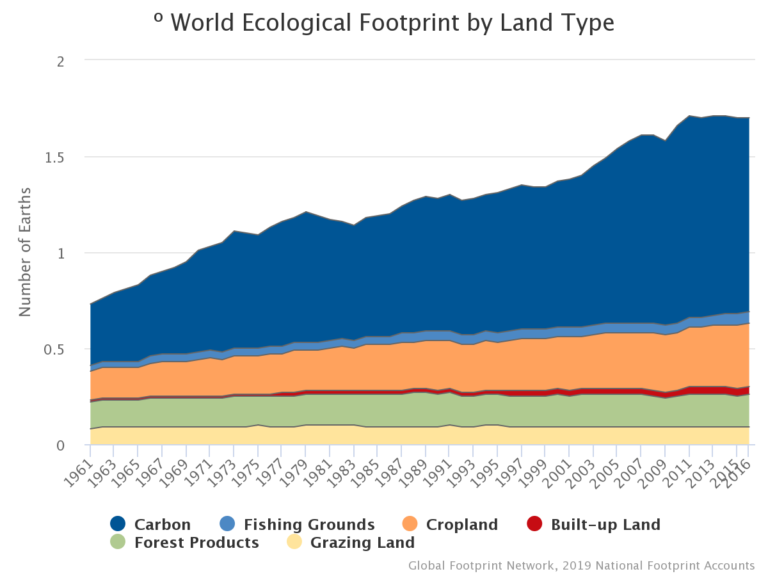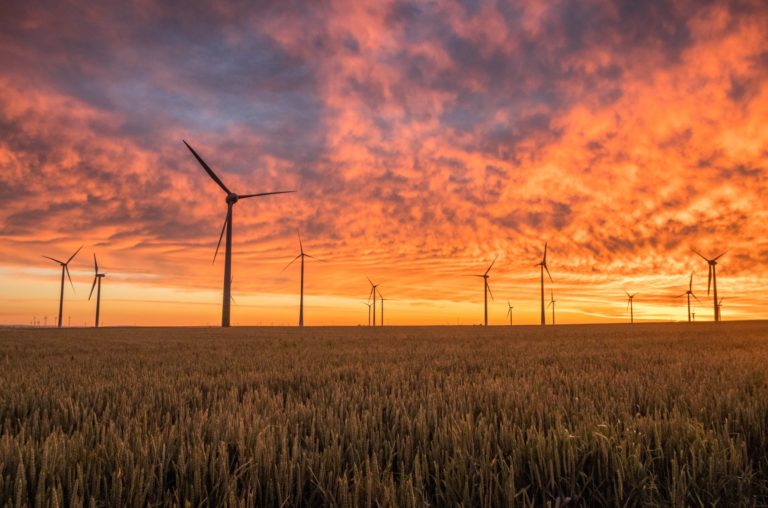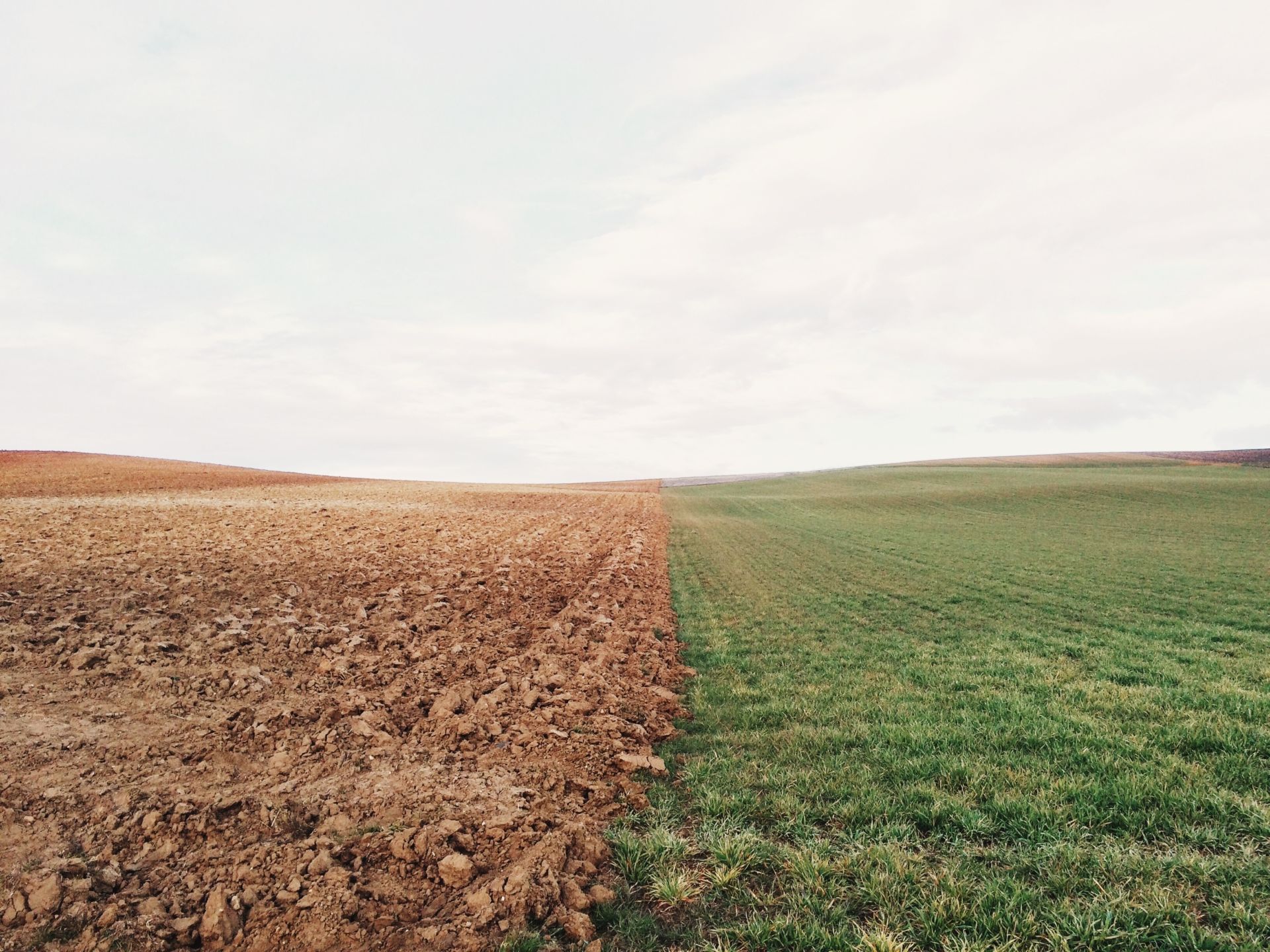Ponzi (or pyramid) schemes are scams in which you rob Peter to pay Paul. But no individual has been greater at implementing a Ponzi scheme than Bernie Madoff: his scheme vaporized $65 billion of client money. He relied on a steady flow of new investments so he could pay “returns” to earlier investors. He took from the future to pay for the present. No wonder Ponzi schemes are illegal in most countries.
Yet collectively, Madoff has been massively outdone: Our current economies are running the largest Ponzi scheme ever. We are using the Earth’s future resources to power our current economies. Currently, humanity consumes the planet’s natural resources more quickly than Earth can replenish them. Debt balloons and eventually bursts. Humanity’s ecological debt shows up as carbon in the atmosphere, collapsing fish stocks, shrinking forests, eroding soils, and depleting groundwater.
Let’s take a look at the numbers, based on the most pedestrian science you can imagine. The science involves counting sheep, beans, potatoes, carbon emissions, etc., and adding all these demands in terms of productive areas needed to provide these goods. This is what the Ecological Footprint and biocapacity accounts do.
The sum of this demand is humanity’s “Ecological Footprint,” now 21.4 billion hectares. But the surfaces of our planet that can provide for this biological regeneration (or “biocapacity”) amount to only 12.3 billion hectares. In other words, we are 9 billion hectares short.

This means humanity is currently using nature 1.75 times faster than ecosystems replenish, akin to using 1.75 Earths. These results, based on UN data, are also available for countries all the way back to 1961.

Ecological Footprint and biocapacity data are extremely relevant because the planet’s regeneration is the most limiting material factor for the human enterprise. Fossil fuel underground is limited as well, but not as limiting as Earth’s regeneration, because the use of that fuel is far more constrained by how many emissions the biosphere can tolerate. The Earth’s capacity to sequester more carbon is far less than the remaining fossil stock underground.
For some time, it is possible to overuse and abuse, but only for so long. Eventually, like with money, the bank breaks, and we can no longer overdraw our depleted accounts. The choice is simple because the eventual end of overshoot is a given, just as gravity is a given. We can choose between having it happen by disaster, or getting out of overshoot by design.
This overuse of Earth’s resources is a direct outcome of our linear economic model. We take from one place, use the stuff, and then throw it away somewhere else. This linear thinking is blind to the Earth’s finite nature, not even realizing that it is fundamentally depleting the life-support systems we depend on. Our culture seems to have forgotten that we live in a cyclical world, not in an endless pipe where we can get more and more pushed into the pipe, use it up, and get rid of more and more waste at the other end.
For this reason, the late artist Friedreich Hundertwasser identified the straight line as the root cause for our destructive and voracious society. In his manifesto, he called the straight line “godless and immoral.”
The circular economy may use less judgmental words than Hundertwasser, but rises from the same recognition. Without recognizing that we are embedded in the flows of nature rather than living in an infinite pipe, without mimicking the cycles of nature, without closing the loops of nutrients and valuable materials, we will continue to spoil and ultimately destroy our only home.

To operate within the context of our finite planet, circular economies distinguish two key cycles. One is the technical cycle of non-biological materials such as metals, plastics, chemicals etc., that can lead to persistent pollution if not carefully managed.
The other is the biological cycle, as in ecosystems powered by the sun to generate plant matter through photosynthesis, that eventually composts to become nutrients for new plant life, or that gets consumed by other organisms, including animals, which in turn also become compost.
How does the circular economy with its biological and technical cycles link to our ultimate planetary limits? It is simple: A circular economy fits within the planet’s possibilities, if it has:
- a closed technical loop, particularly for substances not consistent with the biosphere (most importantly those that can persistently pollute the biosphere or the groundwater).
- a biological loop that fits within the regenerative capacity of the planet. This loop is the engine of all activities, particularly as we move to a regenerative economy in response to the climate challenge. In other words, we need metrics that track to what extent human demand stays within the planet’s regeneration rates, otherwise the circular economy still gobbles up our biological capital.
A truly circular economy, based on these two conditions, is what we need. We have the tools to measure whether we are getting closer to it or not.
With all the available climate science, it also becomes obvious that the only viable path forward is an economy that lives off our planet’s regeneration, rather than its liquidation. The choice is merely how fast we get out of liquidating fossil fuels and, with it, Earth’s climate stability.

We can go faster and comply with the Paris Climate Agreement, thereby rescuing much of our precious biocapacity (this means ceasing fossil fuel use well before 2050). Or we can go slower, and still have to eventually move out of fossil fuel use, leaving us with less, and less reliable, biocapacity. Either way, it becomes clear that climate action is a question of resource security. In other words, if your city or your country is not getting ready for the inevitable future, your city or country will be ill-equipped to operate in a world where carbon- and resource-intensive economies are no longer an option. There is no benefit in undermining your own future by continuing to expand resource-dependent infrastructure and resource-intensive economic sectors. We are not stuck in a “Tragedy of the Commons” – rather we are stuck in the belief that we are trapped in such a “Tragedy of the Commons,” thereby waiting unnecessarily for others to act first. What are we waiting for?
The basic science is not equivocating. Greta Thunberg, speaking to the UK Houses of Parliament on April 22, 2019, was quite blunt with politicians: “You don’t listen to the science because you are only interested in solutions that will enable you to carry on like before. Like now. And those answers don’t exist anymore. Because you did not act in time.”
We can build a thriving future for all within the means of our one planet. It is technically possible, it is financially superior, and probably more aesthetically pleasing. We call it ‘one-planet prosperity.’ Or do you want to carry on like before, living in your linear pipe that turns everything into unusable waste, and preparing for ‘one-planet misery?’
The silver-lining is that carrying on like before does not serve us anyhow. We can build a thriving future for all within the means of our one planet. It is technically possible, it is financially superior, and probably more aesthetically pleasing. We call it “one-planet prosperity.” Or do you want to carry on like before, living in your linear pipe that turns everything into unusable waste, and preparing for “one-planet misery?”
It is your planet. You are in the driver seat.










